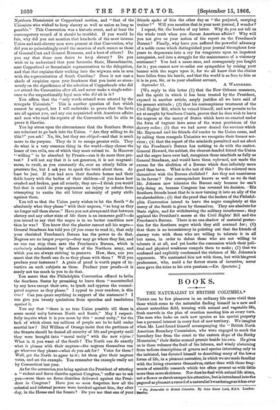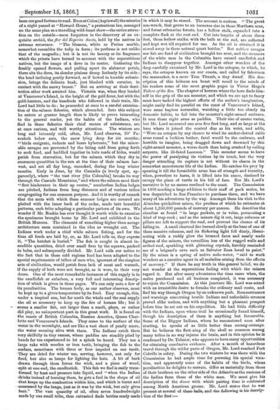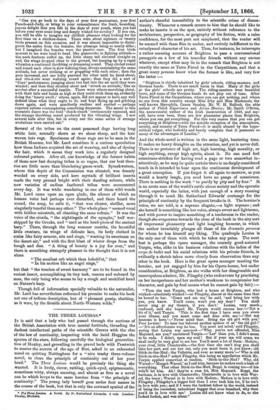BOOKS.
THE NATURALIST IN BRITISH COLUMBIA.*
THBRE can be few pleasures in an ordinary life more vivid than those which come to the naturalist finding himself in- a new and almost untrodden field, teeming with animal and vegetable life, fresh marvels in the plan of creation meeting him at every turn. The man who looks on each new species as his special property has a personal interest in every foot of new territory. We imagine when Mr. Lord found himself accompanying the "British North American Boundary Commission, who were engaged to mark the boundary line from the -coast to the eastern slope of -the Rocky Mountains," their duties seemed prosaic beside his own. He gives us in these volumes-the fruit of his labours, and wisely abstaining from tedious descriptions of genera and species interesting only' to the initiated, has devoted himself to describing many of the lewer forms of life, in a pleasant narrative, in which we are made familiar with the living creatures -themselves, rather than with- those frag- ments of scientific research-which too often present uzi.
more than mere skeletons. Nor do efs he deal with animal life alone, not a flower or shrub escapes his attention, but is introduced into-the pagesof as pleasant a record of a naturalist's wanderingSas ithas ever
Naturalist in British Columbia. By John Beast Lord, F.Z.S. Loncton;
been ourgood fortune to read. Even at Colon (Aspinwall) the miseries of a night passed at "Howard House," a pretentious inn, managed on the same plan as a travelling wild-beast show—the entire attrac- tion on the outside—seem forgotten in the discovery of an ex- quisite orchid, the for del Espiritu Santo, held by the natives in extreme reverence. "The blossom, white as Parian marble, somewhat resembles the tulip in form ; its perfume is not unlike that of the magnolia ; but it is not its beauty or its fragrance which the priests have turned to account with the superstitious natives, but the image of a dove in its centre. Gathering the freshly opened flowers, and pulling apart its alabaster petals, there sits the dove, its slender pinions droop listlessly by its side ; the head inclining gently forward, as if bowed in humble submis- sion, brings the delicate beak, just blushed with carmine, in contact with the snowy breast." But on arriving at their desti- nation other work awaited him. Victoria was, when they landed at Vancouver's Island, in the height of the gold fever, but with the gold-hunters, and the hundreds who followed in their train, Mr. Lord had little to do ; he proceeded at once to a careful examina- tion of the salmon fisheries, which abounded. Into this subject he enters at greater length than is likely to prove interesting to the general reader, yet the habits of the Indians, who find in these fisheries their chief means of subsistence, are at once curious, and well worthy attention. The winters are long and intensely cold, often, Mr. Lord observes, 30° Fa- renheit below zero, the snow lying deep for six months; "birds emigrate, rodents and bears hybernate," but the miser- able savages are prevented by the biting cold from going forth to seek food, and huddled together in huts made of hides, would perish from starvation, but for the salmon which they dry in enormous quantities in the sun at the time of their salmon har- vest, and eat all day long, uncooked, during the long winter months. Early in June, by the Cascades (a lovely spot, ap- parently), where "the vast river [the Columbia] breaks its way through the Cascade Mountains," and where the salmon meet their " first hinderance in their up course," numberless Indian lodges are pitched, Indians from long distances and of various tribes congregating for one common purpose. And it is worthy of remark that the mats with which these summer lodges are covered are plaited with the inner bark of the cedar, made into beautiful patterns, each tribe adopting a particular pattern of its own. We wonder if Mr. Ruskin has ever thought it worth while to examine the specimens brought home by Mr. Lord and exhibited in the British Museum. The elements of something higher than savage architecture seem contained in the idea so wrought out. The Indians work under a chief while salmon fishing, and for the time all feuds are laid by, or, as Mr. Lord tells us, they express it, "The hatchet is buried." The fish is caught in almost in- credible quantities, dried over small fires by the squaws, packed in bales, and subsequently divided. Mr. Lord calla our notice to the fact that in these cold regions food has been adapted to the special requirements of tribes of men who, ignorant of the simplest arts of civilization, would perish from lack of meat and warmth, if the supply of both were not brought, as it were, to their very doors. One of the most remarkable instances of this supply is in the candlefish or eulachon, a very full and interesting descrip- tion of which is given in these pages. We can only note a few of its peculiarities. The human body, as our author observes, must be kept up to a given temperature by its food. Easy enough, this, under a tropical sun, but far north the whale and the seal supply the oil so necessary to keep up the fire of human life ; but it * seems a smaller fish, not larger than a smelt, plays, or rather did play, no unimportant part in this great work. It is found on the coasts of British Columbia, Russian America, Queen Char- lotte and Vancouver's Islands. They come to the surface of the water in the moonlight, and are like a vast sheet of pearly nacre, the water seeming alive with them. The Indians catch them =very skilfully in tiny canoes, whose paddles are steadily plied by hands far too experienced to let a splash be -heard. They use a large rake with wooden or iron teeth, bringing the fish to the 'surface, sometimes with three or four impaled on one tooth. "They are dried for winter use, serving, however, not only for food, but also as lamps for lighting the huts. A bit of bark 'drawn through them forms the wick, and a piece of wood, split at one end, the candlestick. This fish we find is easily trans- formed by heat and pressure into liquid, and "when the Indian 'drinks instead of burning them, he gets a fuel in the shape of oil that keeps up the combustion within him, and which is burnt and consumed by the lungs, 'just as it was by the wick, but only gives heat." The vast quantity of oil, often seven hundredweight made by one small tribe, thus extracted finds bottles ready made in which it may be stored. The account is curious. "The great sea-wrack, that grows to an immense size in these Northern seas, and formg submarine forests, has a hollow stalk, expanded into a complete flask at the root end. Cut into lengths of about three feet, these hollow stalkai- with the bulb at the end, are collected and kept wet till required for use. As the oil is obtained it is stored away in these natural quart bottles." But neither savages nor fish are fond of civilization brought too near, and the steamers of the white man in the Columbia have caused candlefish and Indians to disappear together. Amongst other wonders of the deep carefully examined by Mr. Lord is the octopus, to which, he says, the octopus known on our coasts, and called by fishermen the mansucker, is a mere Tom Thumb, a tiny dwarf. His des- cription of this hideous Sea beast -will recall to the minds of his readers some of the 'most graphic pages in Victor Hugo's Toilers of the Sea. The chapter of horrors where the hero finds him- self in the grip of the sea monster, and which we are apt to fancy must have tasked the highest efforts of the author's imagination, might easily find its parallel on the coast of Vancouver's Island, were some hapless naturalist, watching a little too closely its domestic habits, to fall into the monster's eight-armed embrace. It uses these eight arms as paddles. Their size of course varies, but Mr. Lord measured one arm five feet-long, and as large at the base where it joined the central disc as his wrist, and adds, "Were an octopus by any chance to wind its sucker-dotted cable arms round a luckless bather, fatal would be the embrace, and horrible to imagine, being dragged down and drowned by this eight-armed monster, a worse death than being crushed by coiling serpents, like ill-fated Laocoon." This monster seems to have the power of paralyzing its victims by its touch, but, the very danger attending its capture is not without its charm in the somewhat monotonous life of the Indian. He catches his prey by spearing it till the formidable arms lose all strength and tenacity, when, powerless to harm, it is lifted into his canoe, destined to occupy the place of turtle in his bill of fare. But Mr. Lord's narrative is by no means confined to the coast. The Commission in 1860 needing a large addition to their staff of pack mules, he was despatched to San Francisco to purchase them, and we have many of his adventures by the way. Amongst them his visit to the Almaden quicksilver mines, the produce of which he estimates at about 1,350,000 pounds of mercury per annum. He describes the cinnibar as found "in large pockets, or in veins, permeating a kind of trap-rock ; and as the miners dig it out, large columns or pillars are left to support the roof, and prevent the chance of its falling in. A small charcoal fire burned slowly at the base of one of these massive columns, and its flickering light fell dimly, illumi- nating with a ruddy glow the bronzed faces and nearly nude figures of the miners, the vermillion hue of the rugged walls and arched roof, sparkling with glittering crystals, forcibly reminded me of a brigand's cave such as Salvator Rosa loved to paint." By the mines is a spring of native soda-water, "said to work wonders as a curative agent in all maladies arising from the effects of mercury." If there be any truth in this general belief, we do not wonder at the superstitious feeling with which the miners regard it. But after many adventures the time came when, the mules purchased and all business completed, it was necessary to rejoin the Commission. At this juncture Mr. Lord was seized with an irresistible desire to forsake the ordinary mail route, and find his way through Oregon by an unknown path. Remonstrances and warnings concerning hostile Indians and unfordable streams proved alike useless, and with anything but a pleasant prospect before him he set out on his expedition. He had little difficulty with the Indians, upon whose trail he occasionally found himself, though his description of them is , anything but favourable. Some of the Digger Indians, whom he encountered soon after starting, he speaks of as little better than ourang-outangs. But he believes the flattaning of the skull so common among many tribes in no way injures the brain, and in this opinion he is confirmed by Dr. Tolmier, who appears to have many opportunities for obtaining conclusive evidence. After a month of hazardous travel through the wilder parts of Oregon, Mr. Lord reached Fort Colville in safety. During the two winters he was there with the Commission he had ample time for pursuing his special voca- tion, and apparently some of the habits of the 'birds, whose peculiarities he delights to narrate, differ as materially from those of their brethren on the other side of the Atlantic as the customs of the Indian from those of the white man. We--must give his description of the dance with which pairing time is celebrated among North American grouse. Mr. Lord states that he was present-at several of-these-ballerand-the -following is his descrip- tion of the first:-
"Can you go back to the days of your first pantomime, your first Punch-and-Judy, or bring to your remembrance the fresh, bounding, joyous delight that you felt in the days of your youth, when you had before your eyes some long and deeply wished-for novelty ? If you can, you will be able to imagine my childish pleasure when looking for the first time on a chicken-dance. There were about eighteen or twenty birds present on this occasion, and it was almost impossible to distin- guish the males from the females, the plumage being so nearly alike ; but I imagined the females were the passive ones. The four birds nearest to me were head to head, like gamecocks in fighting attitude— the neck feathers ruffed up, the little sharp tail elevated straight on end, the wings dropped close to the ground, but keeping up by a rapid vibration a continued throbbing or drumming sound. They circled round and round each other in slow waltzing time, always maintaining the same attitude, but never striking at or grappling with each other; then the pace increased, and one hotly pursued the other until he faced about, and tite-d-tete went waltzing round again ; then they did a sort of ' Cure ' performance, jumping about two feet into the air until they were winded; and then they strutted about and struck an attitude,' like an acrobat after a successful tumble. There were others marching about, with their tails and heads as high as they could stick them up, evidently doing the heavy swell ;' others, again, did not appear to have any well defined ideas what they ought to do, and kept flying up and pitching down again, and were manifestly restless and excited — perhaps rejected suitors contemplating something desperate. The music to this eccentric dance was the loud chuck-chuck ' continuously repeated, and the strange throbbing sound produced by the vibrating wings. I saw several balls after this, but in every one the same series of strange evolutions were carried out."
Several of the tribes on the coast possessed dogs having long white hair, annually shorn as we shear sheep, and the hair woven into rugs. Specimens of these rugs are to be seen in the British Museum, but Mr. Lord considers it a curious speculation how these Indians acquired the art of weaving, and also of dyeing the hair, which it seems they work into a regularly designed coloured pattern. After all, our knowledge of the former habits of these now fast decaying tribes is so vague, that our best theo- ries are little more than-blundering-guess-work. Symakwateen, where this depot of the Commission was situated, was densely wooded on every side, and here myriads of brilliant insects made the very ground bright with their da77Iing colours, while new varieties of endless feathered tribes were encountered every day. It was while wandering in one of these wild woods Mr. Lord came upon an open glade, the silence of which no human voice had perhaps ever disturbed, and there heard the sound, the song, he calls it, "that was clearer, shriller, more singularly tuneful than any other." The whole place "seemed vocal with hidden minstrels, all chanting the same refrain." It was the voice of the cicada, "the nightingale of the nymphs," half wor- shipped by the Greeks, and "used as the head-piece of the ancient harp." There, through the long summer months, the beautiful little creature, its wings of delicate lace, its body clothed in scales like fairy armour, sits and sings, "wasting its sweetness on the desert air," and with the first blast of winter drops from the bough and dies. "A thing of beauty is a joy for ever," and there is something strangely pleasant in the thought that it is not
alone "The smallest orb which thou behold'st," that "In his motion like an angel sings," but that "the touches of sweet harmony" are to be found in the veriest insect, accomplishing its tiny task, unseen and unheard by man, the only being who seems to lay a rough and unskilled hand on Nature's harp.
Though full of information specially valuable to the naturalist, Mr. Lord has nevertheless redeemed his promise to make his book not one of tedious description, but of "pleasant gossip, chatting, as it were, by the fireside about North-Western wilds."
































 Previous page
Previous page